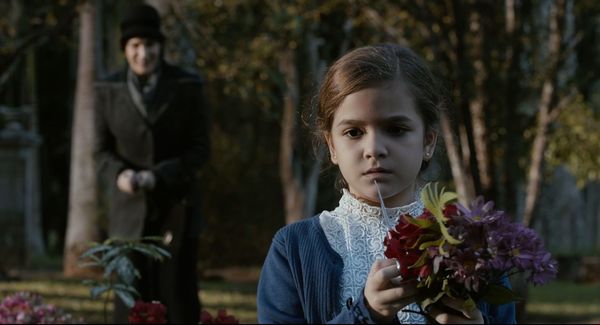Eye For Film >> Movies >> Through The Shadow (2016) Film Review
Through The Shadow
Reviewed by: Jennie Kermode

"My father's gardener / Do not cut my hair / My mother combed it / My step-mother buried me / Because of the figs on the fig tree."
It's an old children's song, Xô Passarinho, based on a fable about murder and ghostly voices; and it creates a sense of something eerie right at the start of this Brazilian reworking of The Turn Of The Screw. It's sung by a little girl, Elisa (Mel Maia), in a luxurious garden. There is no stepmother here, but she's getting a new governess: Laura (Virginia Cavendish), who is dressed all in black because she's mourning her recently deceased mother. This immediately gives the young woman an aspect of liminality, of closeness to dead things that is at odds with the new life she is beginning. Having been given the keys to the estate, she has been told by its owner that she will be its mistress for the foreseeable future, looking after Elisa and, as it turns out, her brother Antonio (Xande Valois), who will soon return from his boarding school under mysterious circumstances. Also present is housekeeper Dona Geraldina (Ana Lúcia Torre), who is friendly but secretive, keenly aware of the house's past.

Is there a strange man climbing on the roof? This is Laura's first clue that something might be amiss; nobody seems willing to talk about it. A door is unexpectedly closed to her. She bonds with Elisa, but the child says she misses her old governess. "She shouldn't have done what she did."
Walter Lima Jr's exquisitely photographed film is big on atmosphere, short on structural detail - very much in the spirit of Henry James' work, and you will get more out of it if you are already familiar with that. The story transitions smoothly to the tropics, where heat, rather than cold, is now the oppressor. It takes on new resonances in the process given Brazil's complex history of disappearances and snatched children. Like her English counterpart, Laura grows afraid for the children, convinced that someone or something is threatening their safety. Lima Jr, however, is more explicit about the possibility that it might be her.
The sense of sexual threat in the original story, less obvious today but strikingly so to its first readers, takes a different and in many way more disturbing direction here, facilitated by the languid atmosphere of the house and its surroundings. Class divisions remain potent, often marked out by skin colour. Antonio spying on amorous servants hints at the taboos that have shaped the lives of those on the estate. It's a place where madness doesn't seem like something out of the ordinary, and where Laura's increasing certainly about the things she sees, which no-one else sees or will admit to, is treated with cynicism yet with kindness. Nobody suggests that she isn't fit to look after the children in this state. It's almost as if they expected it.
Laura's sense that she is caught up in something beyond her control is sympathetically evoked by Cavendish, who is obliged to segue between extremes of emotion yet maintains a sense of coherence, taking viewers along a path that many will not recognise until the end. The necessarily tight story unravels a bit in the second half and some elements might have been better dispensed with or seriously pared down, but in the end this is an effective chiller which, in so far as it maintains the ambiguity of its source material, ventures into some very dark places.
Reviewed on: 27 Aug 2016
















